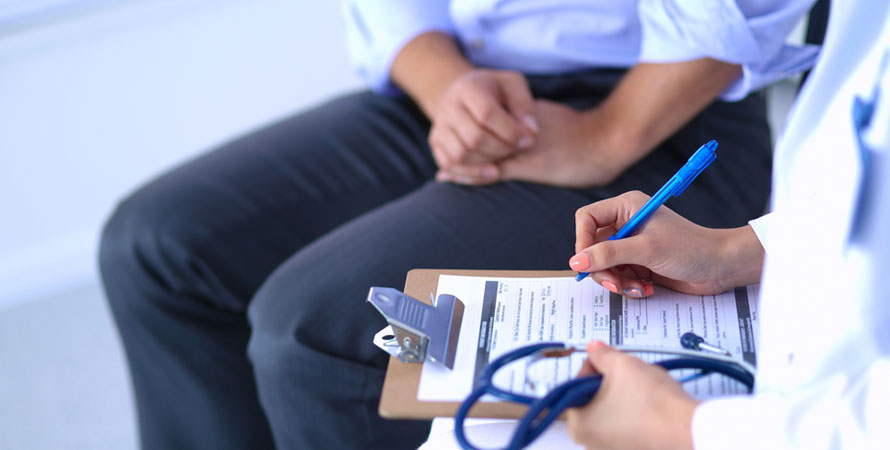Delayed ejaculation is a condition in which the man needs sexual stimulation for a long period to reach orgasm and release sperm from the penis (ejaculate). Some men who suffer from delayed ejaculation cannot ejaculate at all.
How to prepare for a medical consultation
About
Delayed ejaculation can be a temporary problem or it can last throughout life. Possible causes include certain chronic health problems, surgery, and side effects of certain medications. The treatment of delayed ejaculation depends on the underlying cause.
It is normal for men to suffer from delayed ejaculation from time to time. Delayed ejaculation becomes a problem only if it lasts or causes discomfort for you or your partner.
Symptoms
Some men who suffer from delayed ejaculation need more than 30 minutes of stimulation to achieve orgasm and ejaculate. Other men cannot ejaculate at all (anejaculation). There is no specific duration to diagnose delayed ejaculation. On the other hand, you probably experience delayed ejaculation if the delay causes discomfort or frustration or if you have to stop sexual activity due to fatigue, mental irritation, lack of erection or any request from your partner.
Often, men have difficulty achieving orgasm during intercourse or during other sexual activities with their partner, and some men can only ejaculate after masturbation.
Based on the symptoms, delayed ejaculation is divided into the following types:
- From the beginning of sexual life vs. acquired. In the first case, the problem is present from the moment of sexual maturation. Acquired delayed ejaculation occurs after a period of normal sexual functioning.
- Generalized vs. situational. Generalized delayed ejaculation is not limited to a certain sexual partner or to a certain way of stimulation. Situational delayed ejaculation occurs only in certain circumstances.
These categories help to diagnose the cause and establish the most effective treatment.
Causes
Delayed ejaculation can be a consequence of medication, chronic health problems or surgery. It could also be caused by excessive alcohol consumption or a mental disorder, such as depression, adaptation to stress or anxiety. In most cases, delayed ejaculation is caused by a combination of physical and psychological factors.
The psychological causes of delayed ejaculation can be:
- Depression, anxiety or other mental disorders
- Problems in the relationship with the partner caused by stress, lack of communication or other aspects
- Anxiety about sexual performance
- Bad opinion about own body image
- Cultural or religious taboos
- Differences between sexual reality with a partner and sexual fantasies
Medicines and other substances that can cause delayed ejaculation can be:
- Certain antidepressants
- Certain antihypertensives
- Certain diuretics
- Certain antipsychotics
- Certain antiepileptics
- Alcohol – in particular, abusive consumption (excess alcohol leads to alcoholism)
Physical causes of delayed ejaculation can be:
- Certain congenital defects that affect the male reproductive system
- Trauma of the pelvic nerves that control the achievement of orgasm
- Certain infections, such as urinary tract infection
- Prostate surgery, such as transurethral resection of the prostate or complete removal of the prostate
- Neurological diseases, such as diabetic neuropathy, stroke or nerve damage in the spinal cord
- Hormonal conditions, such as a low level of thyroid hormones (hypothyroidism) or a low level of testosterone (hypogonadism)
- Retrograde ejaculation, a condition in which sperm returns to the bladder instead of being eliminated through the penis
- For some men, a minor physical problem that causes delayed ejaculation could cause anxiety, which, in turn, could make the ejaculation problem worse
Risk factors
The risk of suffering from delayed ejaculation increases:
- Older age – when men get older it is normal for ejaculation to take longer
- Psychological problems, such as depression or anxiety
- Diseases such as diabetes or multiple sclerosis
- Certain medical interventions, such as prostate surgery
- Medicines, especially antidepressants, antihypertensives or diuretics
- Couple problems, such as poor communication with the partner
- Alcohol abuse, especially if you are a long-time drinker and drink a lot
Complications
- Decreased sexual pleasure for you and your partner
- Stress and anxiety regarding sexual performance
- Marital or couple problems caused by an unsatisfactory sex life
- The inability of the partner to become pregnant (male infertility)
When to go to the doctor
Visiting the family doctor or urologist-andrologist is a good start when you suffer from delayed ejaculation. Schedule a consultation if:
- Delayed ejaculation is a problem for you or your partner
- You suffer from another health problem that may be associated with delayed ejaculation or you are taking a drug treatment that could cause this problem
- Do you have, in addition to the symptoms of delayed ejaculation, other symptoms that may or may not be related to it
Diagnostic
The physical examination and the medical history are sufficient to determine the treatment. However, if the delayed ejaculation seems to be caused by another condition that requires treatment, you will need to do additional investigations or go to a specialist.
Investigations for coexisting problems can be:
- Physical examination. This includes careful examination of the penis and testicles. The urologist will use gentle palpation to make sure everything is normal in the genitals
- Blood Tests. A blood sample will be taken and sent to the laboratory to detect risk factors for cardiovascular disease or to diagnose if you suffer from diabetes, low testosterone or other health problems
- Urine examination (Urine summary). It is used to detect diabetes, urinary infection or other conditions
Treatment
Treatment for delayed ejaculation depends on the underlying cause but may include changing your current medication regimen, as well as psychological counseling.
Drugs
If you are taking a drug treatment that could cause delayed ejaculation, reducing the dose or changing the drug could solve the problem.
There are no drugs approved for the specific treatment of delayed ejaculation. The drugs used in this case were initially used to treat other ailments. Among these are certain medicines for Parkinson’s disease, anxiety or allergies.
Psychological counseling (psychotherapy)
Psychotherapy can be helpful because it targets the mental problem that caused the delayed ejaculation (depression, anxiety). It is also used to address psychological issues that directly affect the ability to ejaculate.
You can attend psychotherapy sessions alone or with your partner. You can also choose to go to a therapist specializing in sexual problems. The type of counseling that is most appropriate depends on the cause of delayed ejaculation.
Prepare for the medical consultation
If you have problems achieving orgasm, talk to your family doctor. He can refer you to a specialist – urologist-andrologist, endocrinologist, psychiatrist or another specialist. Here is some information to help you prepare for your visit to the doctor.
How to prepare for a medical consultation

- Write down all the symptoms you’ve had, including those that don’t seem to have anything to do with delayed ejaculation
- Write down important personal information, including reasons for major stress or recent changes in personal life, illnesses, changes in medication
- Make a list of all the medicines, vitamins, natural supplements you take
- Take your partner with you, if possible. The partner could provide information that will help establish the diagnosis
- Write down some basic questions to address to the doctor: What is the likely cause of delayed ejaculation? What investigations should I do? Is my problem temporary? What treatments are available and which one would you recommend? I have another health problem – how will I manage both? Is there a generic alternative to the drugs you prescribe? Could I go to a specialist? Where can I find more information about my disease?
What the doctor will ask you:
- How long have you had problems with ejaculation? Does it happen from time to time or is it a continuous problem?
- Can you ejaculate during sexual intercourse? Or can you only ejaculate when your partner touches your penis or when you masturbate?
- If you can ejaculate, how long do you do it after intercourse begins?
- Have you had any changes in your sexual desire or any other sexual problems?
- Are there problems in your relationship as a couple?
- Have you recently had any surgery? Have you had any surgery in the pelvic area (to treat prostate hypertrophy)?
- What other chronic health problems or chronic diseases do you have? Do you take medication to treat these illnesses?
- Have you suffered from another sexual problem, such as difficulty getting or maintaining an erection (erectile dysfunction)?
- Do you drink alcohol or use other illegal substances? If yes, in what quantity?
Source:


